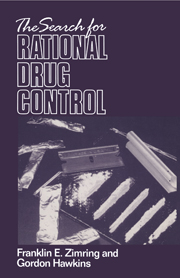Book contents
- Frontmatter
- Contents
- List of tables and figures
- Preface
- Acknowledgments
- Part One The drug problem
- Introduction
- 1 Ideology and policy: A look at the National Drug Control Strategy
- 2 What is a drug? And other basic issues
- 3 Prohibitions and the lessons of history
- 4 The wrong question: Critical notes on the decriminalization debate
- Part Two The drug control policy process
- Appendix: Estimates of illicit drug use - a survey of methods
- References
- Index
4 - The wrong question: Critical notes on the decriminalization debate
Published online by Cambridge University Press: 08 January 2010
- Frontmatter
- Contents
- List of tables and figures
- Preface
- Acknowledgments
- Part One The drug problem
- Introduction
- 1 Ideology and policy: A look at the National Drug Control Strategy
- 2 What is a drug? And other basic issues
- 3 Prohibitions and the lessons of history
- 4 The wrong question: Critical notes on the decriminalization debate
- Part Two The drug control policy process
- Appendix: Estimates of illicit drug use - a survey of methods
- References
- Index
Summary
This chapter is both a summary and a critique of the current debate about decriminalization of drugs in the United States. Section I begins by rehearsing the arguments in favor of decriminalization advanced in the mid-nineteenth century by John Stuart Mill in On Liberty and the late nineteenth-century critique of that argument advanced by James Fitzjames Stephen, “the most powerful and penetrating of the contemporary critics of John Stuart Mill” (Quinton, 1978, p. 87). The Mill-Stephen exchange seems to us to exhaust most of the arguments currently employed in what we call the “polar debate” about drug decriminalization in the United States, a debate in which both sides believe that the only significant question is whether drugs should be prohibited by the criminal law.
Section II adds the two important new wrinkles present in the late twentieth century continuation of the Mill-Stephen exchange as it related to drugs. These new points of emphasis, both prominent in the work of John Kaplan, are the significant role of the costs of maintaining a criminal prohibition in the calculus of policy and the likelihood that separate cost-benefit analyses for each of a wide variety of drugs will produce differing conclusions for different drugs.
Section III restates the decriminalization debate as a clash of presumptions in which those who favor decriminalization argue that when the facts are uncertain, government should presume that a policy that enhances liberty will best serve the public good, and those who support continuation of the criminal sanction contend that in uncertainty it is safest to presume that a continuation of current policy will maximize the public welfare.
- Type
- Chapter
- Information
- The Search for Rational Drug Control , pp. 82 - 110Publisher: Cambridge University PressPrint publication year: 1992

